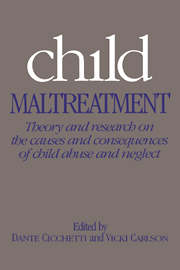Book contents
- Frontmatter
- Contents
- List of contributors
- Preface
- Part I History and definition
- Part II Parental and contextual influences on maltreatment
- Part III The developmental consequences of child maltreatment
- 13 How research on child maltreatment has informed the study of child development: perspectives from developmental psychopathology
- 14 Child maltreatment and attachment theory
- 15 Patterns of maternal behavior among infants at risk for abuse: relations with infant attachment behavior and infant development at 12 months of age
- 16 Finding order in disorganization: lessons from research on maltreated infants' attachments to their caregivers
- 17 Peer relations in maltreated children
- 18 The effects of maltreatment on development during early childhood: recent studies and their theoretical, clinical, and policy implications
- 19 Social cognition in maltreated children
- 20 The effects of maltreatment on the development of young children
- 21 Troubled youth, troubled families: the dynamics of adolescent maltreatment
- 22 Child abuse, delinquency, and violent criminality
- 23 The prevention of maltreatment
- Name index
- Subject index
13 - How research on child maltreatment has informed the study of child development: perspectives from developmental psychopathology
Published online by Cambridge University Press: 04 May 2010
- Frontmatter
- Contents
- List of contributors
- Preface
- Part I History and definition
- Part II Parental and contextual influences on maltreatment
- Part III The developmental consequences of child maltreatment
- 13 How research on child maltreatment has informed the study of child development: perspectives from developmental psychopathology
- 14 Child maltreatment and attachment theory
- 15 Patterns of maternal behavior among infants at risk for abuse: relations with infant attachment behavior and infant development at 12 months of age
- 16 Finding order in disorganization: lessons from research on maltreated infants' attachments to their caregivers
- 17 Peer relations in maltreated children
- 18 The effects of maltreatment on development during early childhood: recent studies and their theoretical, clinical, and policy implications
- 19 Social cognition in maltreated children
- 20 The effects of maltreatment on the development of young children
- 21 Troubled youth, troubled families: the dynamics of adolescent maltreatment
- 22 Child abuse, delinquency, and violent criminality
- 23 The prevention of maltreatment
- Name index
- Subject index
Summary
Introduction
Throughout the past decade, a growing number of investigators have focused their theoretical formulations and empirical research on the normal processes of ontogenesis in the social, emotional, social-cognitive, cognitive, and linguistic domains and on the relation between functioning in childhood and later developmental outcome (Lewis, Feiring, McGuffog, and Jaskir, 1984; Main, Kaplan, and Cassidy, 1985; Sroufe, 1979a, 1983). Much of this work has been guided by the organizational perspective on development (Cicchetti and Schneider-Rosen, 1984, 1986; Cicchetti and Sroufe, 1978; Sroufe, 1979b; Sroufe and Waters, 1976; Werner, 1948) and has been conducted in order to expand our knowledge of the normal developmental process. The study of children who are at high risk for developmental deviation and psychopathology can contribute greatly to our extant theories of normal development (Cicchetti, 1984; Werner, 1948). For example, the empirical investigation of populations where divergent patterns of socioemotional, cognitive, linguistic, and social-cognitive development may be expected as a consequence of the pervasive and enduring influences that characterize the transaction between the child and the environment, such as is the case with maltreated children and their families, provides the appropriate basis for affirming and challenging current developmental theories. Additionally, the study of the developmental organization of high risk children simultaneously allows for the formulation of a more integrative theory of development that can account for the nature of the interrelations among the social, emotional, linguistic, and cognitive/social-cognitive domains (Cicchetti and Schneider-Rosen, 1984; Hesse and Cicchetti, 1982).
- Type
- Chapter
- Information
- Child MaltreatmentTheory and Research on the Causes and Consequences of Child Abuse and Neglect, pp. 377 - 431Publisher: Cambridge University PressPrint publication year: 1989
- 132
- Cited by

